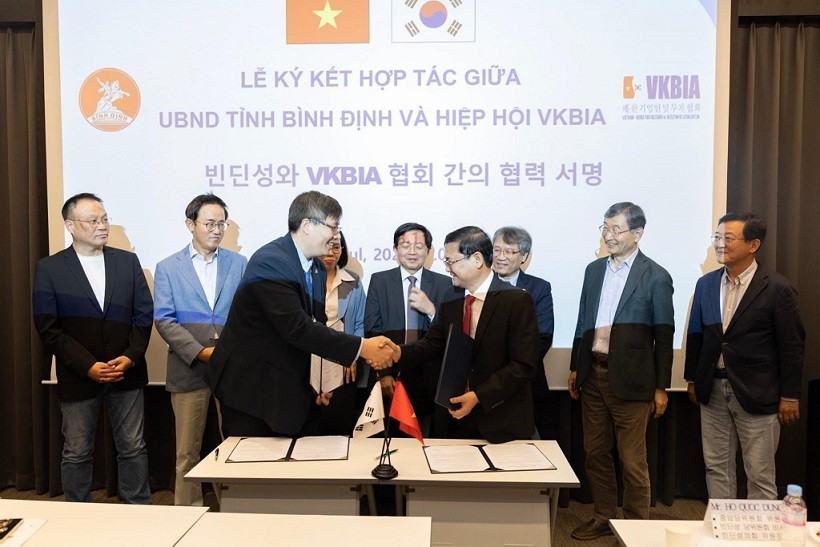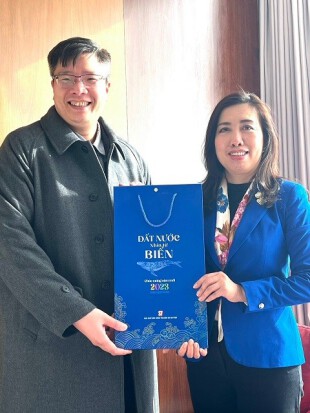
The Vietnamese government is paying special attention to green investment. As an overseas Vietnamese businessman, how do you evaluate the benefits of this field in the country?
– Vietnam is determined to pursue the goal of rapid and sustainable economic growth combined with environmental protection, including a commitment to reduce net zero emissions by 2050, as well as supporting important statements and initiatives on forest and natural resource protection, and green and renewable energy transition. The country also decides to build a green economy and investment structure with three pillars: agriculture, industry, and services to adapt to climate change trends.
However, in the process of green economy and investment development, various difficulties have arisen when a number of specific mechanisms, policies, and regulations have not been clearly implemented, mostly declining at approach suggestions.
On the other hand, green and sustainable transformation in our country still faces many challenges, from the mindset of following a roadmap, to the issue of financial resources for production and business transformation. Besides, in our country, the proportion of small and medium-sized enterprises accounts for 98%.
Most businesses mainly stop at the consideration level and have not yet taken steps to fully implement or make massive investments in green transformation, and also do not clearly understand the real definition of green and circular economy as well as the benefits brought from green investment activities.
Green economy and development have been bringing practical advantages, both in economic and intangible values, helping to increase competitiveness in the international market, especially in the context that our country is participating in the process of extensive international integration and globalization.
Clearly understanding and implementing green economy and investment is an opportunity and also a standard for Vietnam to take advantage of incentives from multilateral and bilateral Free Trade Agreements (FTAs), especially new-generation FTAs. In other words, a few criteria set by FTAs and the international market need to be met if our country “does not want to stay on the sidelines of the game”.
What is your assessment of the role and potential of overseas Vietnamese resources in this field?

– Of the total of nearly 6 million Vietnamese people living abroad today, the percentage of people with higher education is estimated to account for approximately 10%, equivalent to 600 thousand people.
The majority of knowledge experts who are Vietnamese people living abroad work and live in developed countries, and all are experienced and knowledgeable in most key industries and leading fields with modern technology, including electronic communication technology, AI, biotechnology, new material technology, and renewable and green energy.
Recently, the VKBIA has promoted cooperation with partners in the Republic of Korea through many activities as well as supported localities in green investment. Can you mention some outstanding prospects from these activities?
– Regarding green investment, on November 23, the VKBIA and the government of Naju city, Jeollanamdo Provincial Technology Park, and Dongshin University officially signed a comprehensive strategic cooperation agreement on investment, research and promotion of building traditional villages, ecological cities, smart cities with self-reliant energy–carbon neutrality, and low carbon emission growth in some localities in Vietnam.
At the same time, the Association attended the opening ceremony of Daesil Self-Reliant Energy Village Experience Center – Carbon Neutrality, held at Daesil Village, Naju City, Jeollanam-do. This is not only a self-reliant energy sharing economic village model, implemented by the coordination of Dongshin University, Naju City and green energy research units, including Innomotive – a member of the VKBIA – is the coordinating unit, but also a national program aimed at leading the era of carbon neutrality and green energy transition. This model will continue to be applied in the Republic of Korea, and to be oriented towards cooperation and investment, technology transfer and application in some localities in Vietnam.
The VKBIA and One World Impact Capital Limited (OWI) of the United Arab Emirates (UAE) signed a comprehensive strategic cooperation partnership in Seoul, Republic of Korea, on July 14. They agreed to continue cross-border, multinational investment and the transition to a low-carbon economy, with attention to developing capacity to adapt to the green economy, assessing and jointly presiding over the implementation of investment flows in new projects, technologies and developments, especially in fields related to green economy, carbon neutrality, and reduction of greenhouse gas emissions.
On March 28, the VKBIA, the Vietnam – Korea Alliance for Green Mobility (VKERC), and the Office of the RoK National Assembly co-organized “Vietnam-Korea Green Industry and Smart Mobility Forum connecting ASEAN market development”.
Through the above activities and practices during working trips in localities in Vietnam, the application of green economic development solutions requires close coordination between agencies, organizations and functional sectors in implementation.
From the practical experiences of organizations and individuals, what suggestions would you give to further promote green investment in Vietnam?
– The above-mentioned outstanding activities and programs help to see more clearly the potential for more extensive and effective cooperation on green investment and application of science and technology for green industry and green economic development in Vietnam in the upcoming time.
In addition, direct and indirect cooperation programs will certainly continue to be created, serving as a bridge to effectively implement areas of possible cooperation between investment funds, organizations, businesses, universities and research institutes for green investment, economy, and industry, not only limited to the two countries, but also from other developed countries with experience in this field.
In particular, it can be affirmed that the connection between “Government – University – Research unit – Investment fund – Enterprise – Practical application and Beneficiaries” is inseparable.
Le An – Translated by Phuong Linh




